Turning Blood into a Hydrogen Factory
Sean Elliott’s radical research wins RSCA grant

Finally, a story to cheer both environmentalists and vampires: a College of Arts & Sciences researcher is working on deriving clean fuel—from blood components.
In fact, Sean Elliott’s work is so way-out intriguing that the associate professor of chemistry won a $100,000 grant from the Research Corporation for Science Advancement (RCSA), one of the oldest foundations in the United States. Founded in 1912, the RCSA describes its new “Scialog” grants as a project that supports young scientists doing “transformative research” on “crucial issues of scientific inquiry.”
“It is an extraordinary honor,” Elliott says, both for the venerability of the grantor and because “the scientific review process that is used is of the absolutely highest caliber.” The RCSA’s grant review panel was led by Nate Lewis of the California Institute of Technology, “one of the foremost world experts in solar energy conversion,” says RCSA program officer Richard Wiener.
Elliott works with heme, the form of iron found in blood cells. He says that heme proteins in bacteria are critical wiring for moving electric charges: “Part of what keeps the bacteria alive is the movement of electrons—electricity—from one compartment to another.”
He and his colleagues have proposed a new way to introduce light-sensitive artificial pigments into certain heme proteins found in darkness-dwelling microbes. If they can make it work, the researchers hope to apply sunlight to induce chemical reactions in the pigments that will enable the microbes to produce hydrogen, an environmentally benign fuel.
“Elliott has some encouraging early results,” says Wiener, “and the idea of coupling a robust, genetically modified biological system to a chemical one was seen as highly innovative.”
Before Elliot starts cranking out hydrogen, he says, there’s a lot “pure science” to be done. “We need a better understanding of the fundamental chemistry involving the proteins and enzymes that transfer electrons. We need to understand all of the biological electronic parts, as part of the long-term goal in which we will rewire them.”
The grant “is absolutely essential” to his work, he says, because it is long-term research “that government funding agencies may not be as excited about. The award also shows the interest and approval of our approach from world experts in the area of energy research.”
Rich Barlow can be reached at barlowr@bu.edu.
Comments & Discussion
Boston University moderates comments to facilitate an informed, substantive, civil conversation. Abusive, profane, self-promotional, misleading, incoherent or off-topic comments will be rejected. Moderators are staffed during regular business hours (EST) and can only accept comments written in English. Statistics or facts must include a citation or a link to the citation.